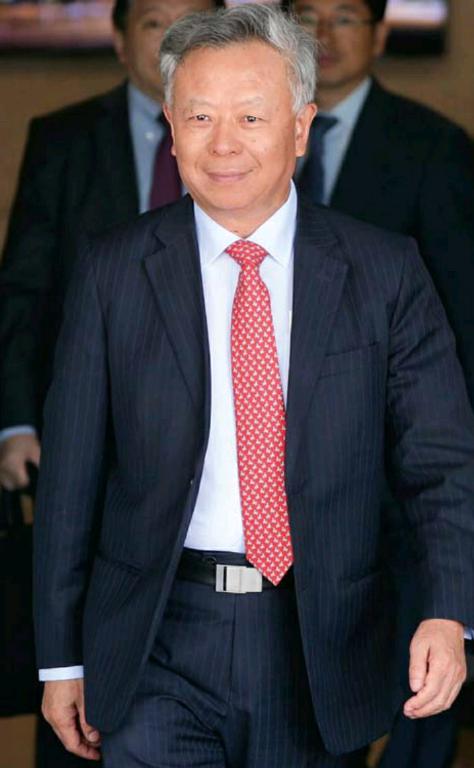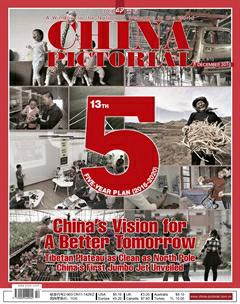Jin Liqun to Head the AIIB
by+Wei+Yiping+and+Ru+Yuan
The First Helmsman
Late August 2015 saw the convention of the sixth chief negotiators meeting of the Asian Infrastructure Investment Bank(AIIB) in Tbilisi, capital of Georgia, at which leading founding member states elected Jin Liqun of China as AIIBs president-designate.
As a matter of fact, Jin Liqun has been tipped for the chair of AIIB since 2014 during preparatory work for the bank. The meeting eventually formalized the expectation by making 66-year-old Jin the helmsman.
The idea of AIIB was mooted first in December 2012 during the Asian Financial Cooperation Forum held in Mumbai, India, when many countries called for attention to infrastructure development in Asia. Later, senior Chinese officials and specialists worked on the setting up of a new bank in Asia for making such projects feasible in Asia.
Statistics reveal that by 2020, building infrastructural facilities in Asian countries would require trillions of US dollars, which is beyond the capacity of any of existing international financial organizations. Needless to say, such projects can be funded only by special-purpose institutions. It was recognized that the setting up of a bank like AIIB would contribute greatly to the international financial order and supplement the work being done by World Bank (WB) and Asian Development Bank (ADB).
It is not hard to imagine the challenges in establishing an international multilateral financial organization from scratch. “The ideal choice for AIIBs first head should be someone highly experienced in international financial organizations,” recalls Wang Jun, deputy director of the Research Department of the China Center for International Economic Exchanges. “And, Jin Liqun from China stood out amongst his peers as one of the few with international financial and diplomatic talents combined with a broad global vision and fluency in foreign languages.”
International Talent
Jins “excellent English” might have impressed many at their first meeting.“His English is elegant, and he is well acquainted with both Eastern and Western cultures,” asserts Jia Kang, director of the Institute of Fiscal Science under the Ministry of Finance (MOF).
Born in a family of teachers in Changshu, Jiangsu Province, Jin Liqun showed great interest in English when he was a child. His linguistic talent was apparent in his junior high school where he excelled in English as well as in other subjects.
“I worked extremely harder on arts whilst paying great attention to other subjects, such as math, physics, and chemistry,” Jin recalls in his book. His mathematics record in middle school laid a solid foundation for his future study of economics, particularly in Boston University.
At 29, Jin was enrolled in a postgraduate program at Beijing Foreign Studies University in 1978. He was among the first group of graduates majoring in English after the “cultural revolution” (1966-1976), learning from great Chinese masters of English such as Professors Wang Zuoliang and Xu Guozhang.
In 1980, the year of his graduation, China, as a member state of the World Bank, was facing a critical shortage of qualified English-speaking professionals. A former student of Professor Xu Guozhang asked him to recommend one of his graduates who would be sent to the World Bank. Without the least hesitation, the professor chose Jin.
Opportunities Vs. Challenges
Jin Liqun began his finance and investment career in 1980. He was among the first group of Chinese officials to be involved in international financial affairs since the countrys implementation of economic reform and opening-up policies.
“During the 1980s, the World Bank focused on traditional infrastructure facilities in China, such as highways and power stations,” illustrates David Dollar, WBs Country Director for China and Mongolia in the East Asia and Pacific Region. There were also projects in rural China, including facilities for irrigation and transportation to help increase local farmers income.
From 1994 to 2003, Jin Liqun served as director general of MOFs World Bank Department and later vice minister of Finance in charge of international communication. During this period, Jin paved the way for a number of infrastructural projects ranging from highways, railways, ports, and power generation and transmission to irrigation and water conservation in rural China.
When it comes to WBs loan proj- ects, many still recall with satisfaction the Chinese governments strict supervision of funds. David Dollar believed that WB was happy to collaborate with Beijing because no government was stricter in utilizing project funds than China, thanks to Jins efforts from the very beginning.
In 2003, as Chinas vice minister of Finance, Jin was the first to win the campaign for ADBs vice president, the first Chinese ever to hold this position. During his five-year tenure, Jin coordinated loan projects in dozens of countries, making a stellar contribution to reforming and reorganizing banks and eliminating financial risks in developing countries with the required funds and technical assistance.
Jin took the opportunity to closely observe the operations of these financial institutions.
WBs system – where major decisions require at least 85 percent of the votes, but the United States controls 16 percent of the votes, meaning it holds veto power over all major decisions – has long been criticized. Operational inefficiency is another serious problem. On several occasions, Jin proposed reforms to tackle these problems.
For six years after 2008, Jin Liqun worked for China Investment Corporation and China International Capital Corporation Limited. In October 2014, he quit his jobs and worked full-time for establishing the AIIB.
China has never sought veto power in AIIB and on several occasions, Jin has expressed the Chinese governments determination to keep the countrys door wide open to the outside world.
As the first helmsman of AIIB, Jin Liqun faces great challenges. He would be required to balance the relationship amongst big powers, ensure efficient running of AIIB, and deliver win-win results.

